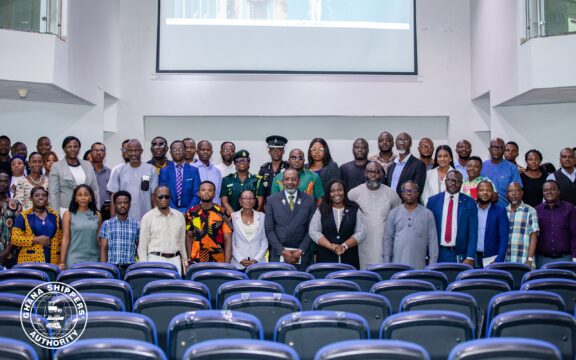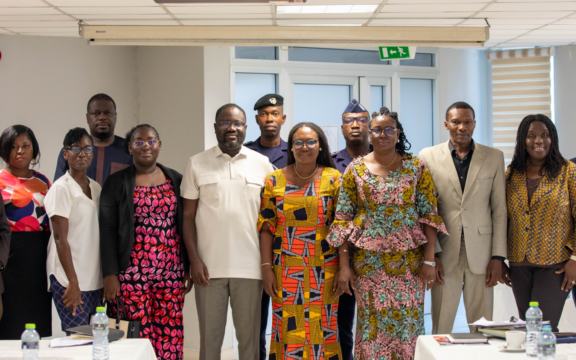As part of efforts to ensure safety along Ghana’s transit corridors and also improve transit trade, the Ghana Shippers’ Authority (GSA) has sensitized members of the Joint Association of Port Transport Unions (JAPTU) and other stakeholders on the transportation of dangerous cargo.
 The Authority has also presented the Union with posters and placards with signs and inscriptions indicating the dos and don’ts of transporting dangerous cargo to be displayed at the offices of JAPTU.
The Authority has also presented the Union with posters and placards with signs and inscriptions indicating the dos and don’ts of transporting dangerous cargo to be displayed at the offices of JAPTU.
The posters and placards are intended to enhance the sensitization drive which was done during the 4th Quarter Transit Shipper Committee Meeting of the GSA, held at the Shippers’ House in Accra on Tuesday 29th November 2022.
 Members of the Committee including representatives of JAPTU were taken through the nine (9) classes of dangerous cargo. These are Explosives, Gases, Flammable Liquids, Flammable Solids, Oxidizing Substances and Organic Peroxide. The rest are Toxic and Infectious waste, Radioactive materials, Corrosive substances and Miscellaneous dangerous goods not covered by the classes stated such as Lithium battery packs in equipment.
Members of the Committee including representatives of JAPTU were taken through the nine (9) classes of dangerous cargo. These are Explosives, Gases, Flammable Liquids, Flammable Solids, Oxidizing Substances and Organic Peroxide. The rest are Toxic and Infectious waste, Radioactive materials, Corrosive substances and Miscellaneous dangerous goods not covered by the classes stated such as Lithium battery packs in equipment.
Chairman of the Transit Shipper Committee and Head of the Freight and Logistics Department of GSA, Mr. Fred Asiedu Dartey reiterated the need to extend the sensitization outside the Transit Shipper Committee for the benefit of the entire membership of JAPTU.
 He said “to ensure that the issue of safety in transporting dangerous goods is taken seriously, the Authority is considering the possibility of having a trainer of trainers workshop for the leadership of JAPTU in the first Quarter of 2023, so that they can also train their members on the dos and don’ts of transporting dangerous cargo”.
He said “to ensure that the issue of safety in transporting dangerous goods is taken seriously, the Authority is considering the possibility of having a trainer of trainers workshop for the leadership of JAPTU in the first Quarter of 2023, so that they can also train their members on the dos and don’ts of transporting dangerous cargo”.
The representatives of JAPTU present at the meeting commended the GSA for organizing and hosting the programme, and expressed their readiness to avail themselves for future sensitization programmes.
 The Committee also addressed concerns over the exchange rate and use of CFA Francs for trading at Ghana’s borders as well as challenges with the operationalization of the Axle Load Unit at the Aflao border among others.
The Committee also addressed concerns over the exchange rate and use of CFA Francs for trading at Ghana’s borders as well as challenges with the operationalization of the Axle Load Unit at the Aflao border among others.









